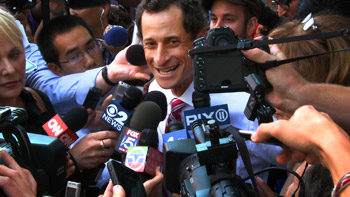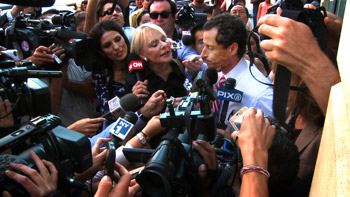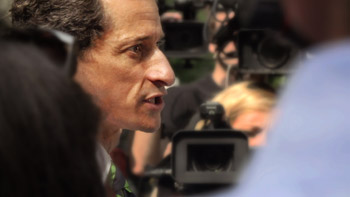Josh Kriegman and Elyse Steinberg Weiner Interview

Josh Kriegman and Elyse Steinberg Weiner Interview
Cast: Huma Abedin, Amit Bagga, Adam S. Barta
Directors: Josh Kriegman, Elyse Steinberg
Genre: Documentary
Rated: MA
Running Time: 96 minutes
Synopsis: Anthony Weiner was a young congressman on the cusp of higher office when a sexting scandal forced a humiliating resignation. Just two years later, he ran for mayor of New York City, betting that his ideas would trump his indiscretions. He was wrong. With unprecedented access to Weiner, his family, and his campaign team, Weiner is a thrilling look inside a political comeback-turned-meltdown. What begins as an unexpected surge to the top of the polls takes a sharp turn once Weiner is forced to admit to new sexting allegations. As the media descends and dissects his every move, Weiner desperately tries to forge ahead, but the increasing pressure and crippling 24- hour news coverage halt his political aspirations. Weiner walks the line between political farce and personal tragedy. With the city of New York as a loud and bustling backdrop, this documentary charges through an increasingly baffling political campaign with unflinching clarity, humour, and pathos.
Weiner
Release Date: July 28th, 2016
 Interview with Josh Kriegman and Elyse Steinberg
Interview with Josh Kriegman and Elyse Steinberg
Question: While watching the film, I was continually amazed at how intimate your access was. How did you get so close to Anthony Weiner?
Josh Kriegman: I worked for Anthony when he ran for mayor in 2005, and later as his New York Chief of Staff. After I left politics and went into film production, he and I stayed in touch and when I heard he was running for mayor in 2013, I was eager to capture that story. No one had any idea how it was going to unfold or what would happen, but I knew it was going to be a pretty extraordinary event. I started filming on the first day of the campaign and was there all the way through the end.
Question: How did you structure your collaboration with him? Were there things he said were off limits or was he just generally open?
Josh Kriegman: Anthony is a very open guy and is obviously very comfortable in front of the camera. There were a few moments when he asked me to turn off the camera and of course I respected that. But for the most part, we had unguarded access with very few barriers.
Question: So, there's an inherent humor in the idea of a New York mayoral candidate getting caught, for the second time, in a silly sexting scandal. Yet the film, while acknowledging this absurdity, never seems to pass judgment.
Josh Kriegman: We thought a lot about this. On some level the whole story is a bit bizarre, and of course the media had a field day making jokes and poking fun. But we were eager to do much more than just make an easy joke. Anthony has been so often reduced to a punch line or a caricature, and we were excited about the opportunity to capture and present him as more of a full person and nuanced human being.
Question: And in terms of the incidents themselves, you never let him off the hook, but you're not puritanical about it either.
Elyse Steinberg: One of the things that is important to us is that the film doesn't take a point of view. It's a verite film. The goal was to give viewers a chance to be in the room and experience it all without passing judgment. A lot of people – including pundits and headline writers – judged Anthony in every possible way, and of course viewers will form their opinions, as well. But as filmmakers, we don't pass judgment.
 Question: The film is very funny, but left me with a bit of melancholy about Anthony's lost promise. You see in your footage all the people he was inspiring at the various campaign events and you can't help but wonder how it all might have been different.
Question: The film is very funny, but left me with a bit of melancholy about Anthony's lost promise. You see in your footage all the people he was inspiring at the various campaign events and you can't help but wonder how it all might have been different. Josh Kriegman: For all of his flaws, most people would acknowledge that Anthony is an enormously talented politician. He was successful for a good reason. He has talent, charisma and energy. He was able to present himself and his ideas in a way that resonated with New Yorkers. They responded to him and loved the energy and ideas that he brought to the conversation. Ultimately he was responsible for his own undoing, but he really had the potential to be the mayor of New York City and a lot of people believe he had a lot to offer. So there certainly is a tragic element to the story.
Elyse Steinberg: Anthony is a very funny person. That was important for us to capture. In the face of intense scrutiny, many people would have just crumbled, but he stays at it and keeps his head high and somehow manages to have a sense of humor. We wanted to capture his spirit.
Question: At the beginning of the film, you set the stage with a montage of news media clips telling us a bit of Anthony's story leading up to his mayoral campaign. But immediately after, you're with him at home. He's there with Huma, wearing shorts and a T-shirt. It felt so surreal to come into that very personal space right after getting the media narrative.
Josh Kriegman: Part of what I think is exciting about the film is that these are larger-than-life personalities that we've seen in the public sphere, and all of a sudden you have a chance to see them differently. You get to see them behind closed doors, in an intimate and personal way. It forces you to remember that while there was this whole scandal circling around them, they were still a family. They were still just a husband and wife who would come home to their apartment, and make dinner, and put their son to sleep.
Elyse Steinberg: It was important to us to show the media perspective, and then to show Anthony and Huma as regular people. Being with them through all of this, you learn something about what it looks like to live at the center of a meltdown or scandal.
Josh Kriegman: This brings up another point that we hope to get across with the film. While the film is an intimate verite experience, at the same time it's not about just one man and one campaign. We hope it raises larger questions about our how our politics and our media function, and how much the public conversation is driven by spectacle and noise. In that environment, it really is striking to witness some of the quieter moments.
Elyse Steinberg: So much of our political discourse today is driven by easy narratives, sensational headlines and outrageous statements. It's a lot of entertainment and theater. In this context our film gives us an unusual opportunity to go beyond the reductive flurry of soundbites and tweets, to look closely at the reality behind the headlines.
Question: There's a very pointed moment in the film where you see the news media heckling Anthony about the scandal, and, meanwhile, there are voters on the street nearby who actually wanted to hear him talk about his politics.
Josh Kriegman: That was certainly Anthony's experience – he wanted to talk with voters about issues and ideas, but he couldn't get past the phalanx of reporters who insisted on talking about his scandal. That said, Anthony does make a point in the film of not blaming the media. As he says, he did the thing, and the media was just playing its role.
Elyse Steinberg: We wanted to show how the whole organism of politics and media function. Anthony did what he did, and reporters were responding to their own pressures and needs. It's a complicated system. We wanted to show the complexity of all the players.
Josh Kriegman: We see this as a film about Anthony. But Huma is a big part of the story. She's by his side early in the campaign, and was there at the press conference when the scandal broke a second time. We wanted to show the reality beyond the headlines, and of course Huma is a big part of that.
Elyse Steinberg: In the same way Anthony was ridiculed and reduced to a caricature, so was she. She has been discussed and judged so much in the media, and now viewers will get to see a more human and personal side of her.
Question: How did the film turn out differently than you might have expected going in?
Josh Kriegman: Along with the rest of the world, we had no idea if Anthony could succeed when he launched his campaign. He was just two years out from an unprecedented scandal. Could New Yorkers really look past this and consider him as a viable candidate? It would have been one of the more remarkable political comeback stories we've ever seen - and for about six weeks, it seemed to be going in that direction! He was leading in the polls and a lot of people were marveling at how he seemed to have redeemed himself. But then, of course, things went in a different direction.
Elyse Steinberg: We have been working on this for three years and Josh shot over 400 hours of footage. We had time to really think about how to tell the story in a way that showed complexity and nuance.
 Question: Has Anthony seen the film?
Question: Has Anthony seen the film?
Elyse Steinberg: No he hasn't seen it yet. We invited him to see it awhile ago and it remains an open invitation.
Question: What's next for him?
Josh Kriegman: I don't know. That's a good question. I'm not sure where he's headed. I think even folks who are critical of him would agree that he's a man of extraordinary talents and has a lot to offer. I don't know what's next though.
Weiner
Release Date: July 28th, 2016
MORE
- Mission: Impossible Fallout
- Glenn Close The Wife
- Allison Chhorn Stanley's Mouth Interview
- Benicio Del Toro Sicario: Day of the Soldado
- Dame Judi Dench Tea With The Dames
- Sandra Bullock Ocean's 8
- Chris Pratt Jurassic World: Fallen Kingdom
- Claudia Sangiorgi Dalimore and Michelle Grace...
- Rachel McAdams Disobedience Interview
- Sebastián Lelio and Alessandro Nivola...
- Perri Cummings Trench Interview



